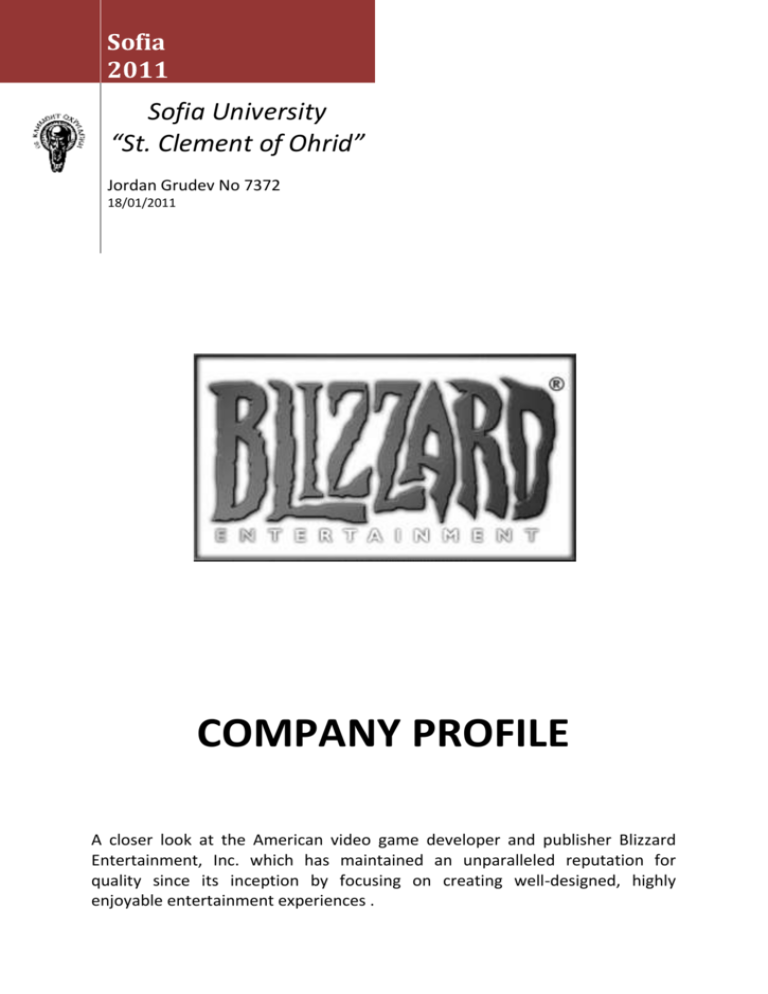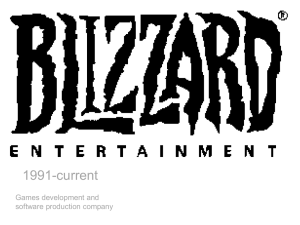course_7372 - InformaticsFEBA
advertisement

Sofia 2011 Sofia University “St. Clement of Ohrid” Jordan Grudev No 7372 18/01/2011 COMPANY PROFILE A closer look at the American video game developer and publisher Blizzard Entertainment, Inc. which has maintained an unparalleled reputation for quality since its inception by focusing on creating well-designed, highly enjoyable entertainment experiences . Contents: 1. Introduction 2. History 2.1. Foundation and early years 2.2. 1997-2004 and Battle.net 2.3. 2004-2010 and World of Warcraft 3. Products 3.1. Early products 3.2. The Warcraft Universe 3.3. The StarCraft Universe 3.4. The Diablo Universe 4. Battle.net 4.1. Revamped Battle.net 4.2. Growth history 5. Mission statement: Blizzard’s eight core values 6. BlizzCon 7. Privacy controversy 7.1. Real ID 7.2. Warden Client 8. Sources 1 1. Introduction Blizzard Entertainment, Inc. is an American video game developer and publisher founded in February 1991 under the name Silicon & Synapse by three graduates of UCLA, Michael Morhaime, Allen Adham and Frank Pearce. Based in Irvine, California, the company originally concentrated primarily on the creation of game ports for other studios before beginning development of their own software in 1993 with the development of games like Rock N' Roll Racing and The Lost Vikings. In 1994 the company became Blizzard Entertainment Inc before being acquired by distributor Davidson & Associates. Shortly thereafter, Blizzard shipped their breakthrough hit Warcraft: Orcs and Humans. Blizzard went on to create several successful PC games, including the Warcraft, Starcraft and Diablo series, and the MMORPG World of Warcraft. Blizzard Entertainment offers events to meet players and to announce games: the BlizzCon in California, United States, and the Blizzard Worldwide Invitational in other countries. Blizzard Entertainment’s track record of back-to-back #1-selling games spans more than a decade, and with blockbuster hits such as StarCraft® II: Wings of Liberty®, World of Warcraft® and its expansions, Warcraft® III: Reign of Chaos®, Diablo® II, and StarCraft®, the company has earned several consecutive Game of the Year awards. In addition, Blizzard Entertainment’s online-game service, Battle.net®, is one of the largest in the world, with millions of active users. The high-quality products based on Blizzard Entertainment’s games have also proven popular and garnered critical acclaim. These products include action figures, novels, manga, board games, pen-and-paper role-playing games, apparel, and the World of Warcraft Trading Card Game, which is a bestseller in its category. Extending the reach of its game universes even further, Blizzard Entertainment is currently at work with Legendary Pictures, the studio behind the feature films Watchmen, The Dark Knight, Batman Begins, Superman Returns, and 300, on a live-action Warcraft movie which will be directed by Sam Raimi. 2 2. History 2.1. Foundation and early years Blizzard Entertainment was founded by Michael Morhaime, Allen Adham and Frank Pearce as Silicon & Synapse in February 1991, a year after all three had received their bachelor's degrees from UCLA. In the early days the company focused on creating game ports for other studios. Ports include titles such as J.R.R. Tolkien's The Lord of the Rings, Vol. I and Battle Chess II: Chinese Chess. In 1993, the company developed games like Rock N' Roll Racing and The Lost Vikings (published by Interplay Productions). In early 1994 they were acquired by distributor Davidson & Associates for $6.75 million. The same year the company briefly changed its name to Chaos Studios, before finally settling on Blizzard Entertainment after it was discovered that another company with the Chaos name already existed. Shortly thereafter, Blizzard shipped their breakthrough hit Warcraft: Orcs and Humans through Interplay. Blizzard has changed hands several times since then: Davidson was acquired along with Sierra On-Line by a company called CUC International in 1996; CUC then merged with a hotel, real-estate, and car-rental franchiser called HFS Corporation to form Cendant in 1997. In 1998 it became apparent that CUC had engaged in accounting fraud for years before the merger; Cendant's stock lost 80% of its value over the next six months in the ensuing widely discussed accounting scandal. The company sold its consumer software operations, Sierra On-line which included Blizzard, to French publisher Havas in 1998, the same year Havas was purchased by Vivendi. Blizzard was part of the Vivendi Games group of Vivendi. In July 2008 Vivendi Games merged with Activision, using Blizzard's name in the resulting company, Activision Blizzard. In 1996, Blizzard acquired Condor Games, which had been working on the game Diablo for Blizzard at the time. Condor was renamed Blizzard North, and has since developed hit games Diablo, Diablo II, and its expansion pack Diablo II: Lord of Destruction. Blizzard North was located in San Mateo, California; the company originated in Redwood City, California. 3 2.2. 1997-2004 and Battle.net Blizzard launched their online gaming service Battle.net in January 1997 with the release of their action-RPG Diablo. In 2002, Blizzard was able to reacquire rights for three of its earlier Silicon & Synapse titles from Interplay Entertainment and rerelease them under Game Boy Advance. In 2004, Blizzard opened European offices in the Paris suburb of Vélizy, Yvelines, France, responsible for the European in-game support of World of Warcraft. On November 23, 2004, Blizzard released World of Warcraft, its MMORPG offering. On May 16, 2005, Blizzard announced the acquisition of Swingin' Ape Studios, a console game developer which had been developing StarCraft: Ghost. The company was then merged into Blizzard's other teams after StarCraft: Ghost was 'postponed indefinitely'. On August 1, 2005, Blizzard announced the consolidation of Blizzard North into the headquarters at 131 Theory in UC Irvine's University Research Park in Irvine, California. In 2008, Blizzard moved their headquarters to 16215 Alton Parkway in Irvine, California. 2.3. 2004-2010 and World of Warcraft World of Warcraft was the fourth released game set in the fantasy Warcraft universe, which was first introduced by Warcraft: Orcs & Humans in 1994. Blizzard announced World of Warcraft on September 2, 2001. The game was released on November 23, 2004, on the 10th anniversary of the Warcraft franchise. The first expansion set of the game, The Burning Crusade, was released on January 16, 2007. The second expansion set, Wrath of the Lich King, was released on November 13, 2008. The third expansion set, Cataclysm entered into closed beta testing in late June 2010 and was released to the public on 7 December 2010. With more than 12 million monthly subscriptions in October 2010, World of Warcraft is currently the world's most-subscribed MMORPG, and holds the Guinness World Record for the most popular MMORPG by subscribers. In April 2008, World of Warcraft was estimated to hold 62 percent of the MMORPG subscription market. In 2008, Blizzard was honored at the 59th Annual Technology & Engineering Emmy Awards for the creation of World of Warcraft. Mike Morhaime accepted the award. 4 3. Products 3.1. Early products Prior to the release of Warcraft: Orcs & Humans, Blizzard Entertainment served as a third-party developer, creating entertainment software for various platforms, including MS-DOS, Macintosh, Sega Genesis, and Super NES. The company’s best-known titles from this era include Rock ‘n Roll Racing®, The Lost Vikings®, and Blackthorne™. In the early days the company focused on creating game ports for other studios. Ports include titles such as J.R.R. Tolkien's The Lord of the Rings, Vol. I and Battle Chess II: Chinese Chess. Each member of the Blizzard Entertainment staff is a true game enthusiast, giving the company invaluable insight into creating products for gamers. 3.2. The Warcraft Universe Blizzard Entertainment’s most recent game release was World of Warcraft: Cataclysm™, the third expansion set to the company’s bestselling and awardwinning subscription-based massively multiplayer online role-playing game, World of Warcraft. Cataclysm was released starting on December 7, 2010, and sold more than 3.3 million copies in its first 24 hours of availability, making it the fastest-selling PC game of all time. This record was previously held by World of Warcraft’s first two expansions, World of Warcraft: The Burning Crusade® and World of Warcraft: Wrath of the Lich King, which sold approximately 2.4 million copies and over 2.8 million copies in their first 24 hours, respectively. 5 World of Warcraft initially launched on November 23, 2004 in North America, Australia, and New Zealand, with subsequent launches in South Korea, Europe, mainland China, Singapore, and the regions of Taiwan, Hong Kong, and Macau in 2005, Malaysia in 2006, Thailand in 2007, and Latin America and Russia in 2008. The game has achieved unprecedented popularity on a global scale, with millions of subscribers worldwide. It is available in eight different languages based on the regions in which it is played, and has earned awards and praise from publications around the world. Blizzard's original Warcraft game, Warcraft: Orcs & Humans™, was touted as one of the best strategy games of 1994, and the game’s epic sequel, 1995’s Warcraft II: Tides of Darkness™, won numerous awards, including the company’s first Game of the Year award. Warcraft III: Reign of Chaos, released in July 2002, has likewise won several accolades and, like StarCraft, has become a staple of professional tournament gaming, along with its expansion, the award-winning Warcraft III: The Frozen Throne®, which was released in July 2003. 3.3. The StarCraft Universe StarCraft II: Wings of Liberty launched on July 27, 2010, and sold more than 1 million copies in its first 24 hours of availability and more than 3 million in its first month, making it the fastest-selling strategy game of all time. Alongside the launch of StarCraft II, Blizzard released a brand new version of its acclaimed online gaming service, Battle.net, which has been redesigned from the ground up to be the premier online gaming destination for Blizzard gamers, with several enhancements and new features, such as voice communication, cloud file storage, leagues and ladders, achievements, stat-tracking, and more. The original StarCraft, which Blizzard Entertainment released in March 1998, was the company’s third #1 seller and was listed as the bestselling game of 1998 by PC Data. The game’s expansion set, StarCraft: Brood War™, was named best expansion of 1998 and is still considered by many critics to be one of the best add-on products to date. 6 StarCraft is a long-running staple of professional tournament gaming. This is especially the case in South Korea, where the game’s mass popularity played a major role in the birth of the professional-gaming and game-broadcasting phenomena, as well as serving as one of the key drivers behind the growth of the PC-game-room business. 3.4. The Diablo Universe On June 28, 2008, Blizzard Entertainment unveiled Diablo III, the latest entry in its landmark action-role-playing game (RPG) franchise, at the Blizzard Worldwide Invitational event in Paris, France. The original Diablo, which shipped to stores in the last week of December 1996, debuted at #1 in the United States and was widely credited as having helped to revitalize the RPG genre. In 2000, Blizzard Entertainment launched the game’s sequel, Diablo II, which set the record for fastest-selling PC game ever at the time of its release. The company followed up in 2001 with the expansion, Diablo II: Lord of Destruction™, which sold more than a million copies in its first month and was one of the biggest sellers of 2001, in addition to receiving widespread critical acclaim. 7 4. Battle.net Battle.net is a premium gaming service provided by Blizzard Entertainment. It was launched in January 1997 with the release of Blizzard's action-RPG Diablo. Battle.net was the first online gaming service incorporated directly into the games that make use of it, in contrast to the external interfaces used by the other online services at the time. This feature, along with ease of account creations and the absence of member fees, caused Battle.net to become popular among gamers and became a major selling point for Diablo and subsequent Blizzard games. Since the successful launch of Battle.net, many companies have published online game services mimicking Blizzard's service package and the user interface. Blizzard officially unveiled the new revamped Battle.net on March 20, 2009. It later revealed further details of the Battle.net revamped features at Blizzcon 2009 which will be supported by StarCraft II, Diablo III and World of Warcraft. The original Battle.net would also be renamed to Battle.net classic. 4.1. Revamped Battle.net Battle.net was revamped by Blizzard in 2009 and was officially unveiled on March 20, 2009, it was further elaborated on during Blizzcon 2009. The new Battle.net (unofficially known as Battle.net 2.0) contains three unique sections. The first allows players to connect all Battle.net accounts, World of Warcraft characters and friends list together and integrate them into a unified single Battle.net account. Players can also unlock achievements in-game which would in turn unlock avatars and decals which would be shown on the player's profile, the decals can also be seen in-game on the player's units. 8 4.2. Growth history According to Blizzard's claims, Battle.net is the largest online gaming network in the neighborhood. Blizzard claims "millions of active users" on Battle.net, and that they are the leaders of online gaming, noting in 2006 that "even Xbox Live is not even close". By November 1997 they had 2.2 million games played, had 1.25 million different users, and averaged 3,500 new users each day. By April 1999, it was reported that Battle.net had 2.3 million active users, and more than 50,000 concurrent users. By September 2002, their active user count had jumped to 11 million. By September 2004, their active user count was up to nearly 12 million, spending more than 2.1 million hours online each day, and they had an average of 200,000 concurrent users, with a peak concurrent user count of 400,000. In November 2008, Blizzard banned over 357,700 accounts that were found to be using third-party hacks. 9 5. Mission Statement: Blizzard’s eight core values “Blizzard Entertainment’s eight core values represent the principles and beliefs that have guided our company throughout the years. These values are reflected in employees' decisions and actions every day.” (The Blizzard Staff) 1) gameplay FIRST: “Everything we do at Blizzard Entertainment is based on the success of the gaming experiences we provide our players. The goal of each discipline within the company -- be it art, programming or customer support -- is to make our games as fun as possible for as many people as we can reach.” (The Blizzard Staff) 2) commit to QUALITY “ “Blizzard polish” doesn’t just refer to our gameplay experiences, but to every aspect of our jobs. We approach each task carefully and seriously. We seek honest feedback and use it to improve the quality of our work. At the end of the day, most players won’t remember whether the game was late -- only whether it was great. “ (The Blizzard Staff) 3) play nice; PLAY FAIR “In our business first impressions are important -- but lasting impressions are everything. We strive to maintain a high level of respect and integrity in all interactions with our players, colleagues, and business partners. The conduct of each Blizzard Entertainment employee, whether online or offline, can reflect on the entire company.” (The Blizzard Staff) 4) embrace your INNER GEEK “Everyone here is a geek at heart. Cutting-edge technology, comic books, science fiction, top-end video cards, action figures with the kung-fu grip…. Whatever it is they’re passionate about, it matters that each employee embraces it! Their unique enthusiasm helps to shape the fun, creative culture that is Blizzard Entertainment.” (The Blizzard Staff) 10 5) every voice MATTERS “Great ideas can come from anywhere. Blizzard Entertainment is what it is today because of the voices of our players and of each member of the company. Every employee is encouraged to speak up, listen, be respectful of other opinions, and embrace criticism as just another avenue for great ideas.” (The Blizzard Staff) 6) think GLOBALLY “Everywhere on the planet there are people who play Blizzard Entertainment games. While respecting the cultural diversity that makes people unique, we strive to grow and support our global gaming community. We also seek the most passionate, talented people in the world to enrich our company and help us forge the future vision of Blizzard Entertainment.” (The Blizzard Staff) 7) lead RESPONSIBILITY “Our products and practices can affect not only our employees and players -- but the industry at large. As one of the world’s leading game companies, we’re committed to making ethical decisions, always keeping our players in mind, and setting a strong example of professionalism and excellence at all times.” (The Blizzard Staff) 8) learn & GROW “The games industry is ever-changing. Technology improves, techniques change, and design philosophies become outdated. Since the founding of Blizzard Entertainment, we’ve worked to improve through experience, teaching one another and cultivating the desire to be the best at what we do. We see this as an individual responsibility as well as a company one. Employees can count on their peers, managers, and the company itself to be supportive and help them gain the knowledge and training they need.“ (The Blizzard Staff) 11 6. BlizzCon BlizzCon first started in October 2005, held at the Anaheim Convention Center where it has been held since. Some features included the announcements of release of new content for their franchises, previews of content for upcoming games, and Blizzard developer Q&A sessions. Throughout the days are hands-on experience of new and existing games, various panels related to the multiple franchises, and judging of the contests being held - including costume and songwriting. The closing night has held a concert, previously The Offspring and Blizzard's in-house band (whose members are employees) Level (10, 60, 70, 80 or "The Artists Formerly Known as Level 80") Elite Tauren Chieftain. Everyone attending gets a "swag bag", which consists of various items related to the Blizzard Franchises. For example, at the 2005 BlizzCon, there was a code that could be exchanged for an in-game pet from World of Warcraft, which was a baby Murloc named 'Murky'. As well, there have been passes to get in to the closed beta test of an upcoming Blizzard game - World of Warcraft: The Burning Crusade from 2005, World of Warcraft: Wrath of the Lich King for 2007, StarCraft II for 2008, and Diablo III for 2010. Tickets for the first three events were US$100 each for admission to both days of activities. For 2009 the price was raised to $125. For 2010, the price was raised to $150. All of the extras in the swag bag, concerts, panels, and contests are included in the price. The similar event is the Blizzard Worldwide Invitational and it can be held in other countries. 12 7. Privacy controversy 7.1. Real ID On July 6, 2010 Blizzard announced that they were changing the way their forums worked to require that users identify themselves with their real name. The reaction from the community has been overwhelmingly negative with multiple game magazines calling the change "foolhardy" and an "Epic Fail". It has also resulted in the largest user response ever on the Blizzard forums. This included personal details of a Blizzard employee who gave his real name "to show it wasn't a big deal". Shortly after revealing his real name, personal information was posted including his phone number, picture, age, home address, family members' name/age/photos and prior convictions. Some technology media outlets have suggested Real ID is a good idea and will benefit both Battle.net and the Blizzard community. But others are worried that Blizzard is opening their fans up to real-life dangers such as stalking, sexual predators, and employment issues, since a simple Google search by your employer will reveal your online activities. Blizzard initially responded to some of the concerns by saying that the changes would not be retroactive to previous posts, that parents could set up the system so that minors cannot post, and that posting to the forums is optional. However due to the huge negative response, Blizzard President Michael Morhaime issued a statement rescinding the plan to use real names on Blizzard's forums for the time being. 7.2. Warden Client Blizzard has made use of a special form of software known as the 'Warden Client'. The Warden client is known to be used with Blizzard's Online Games such as Diablo and World of Warcraft, and the Terms of Service contain a clause consenting to the Warden software's RAM scans while a Blizzard game is running. 13 The Warden client scans a small portion of the code segment of running processes in order to determine whether any of these third-party programs are running. The goal of this is to detect and address players who may be attempting to cheat in the game. As World of Warcraft is a massively multiplayer online game, the actions of a few cheaters can greatly affect the experience of the rest of the game's community. This determination of third party programs is made by hashing the scanned strings and comparing the hashed value to a list of hashes assumed to correspond to cheat programs. The Warden scans all processes running on a computer, not just the World of Warcraft game, and could possibly run across what would be considered private information and other personally identifiable information. It is because of these peripheral scans that Warden has been accused of being spyware and has run afoul of controversy among privacy advocates. The Warden's reliability in correctly discerning legitimate vs illegitimate actions was called into question when a large scale incident happened when many Linux users were banned after an update to Warden caused it to incorrectly detect Cedega as a cheat program. Blizzard issued a statement claiming they had correctly identified and restored all accounts and credited them with 20 days play. The Warden is not the first time Blizzard Entertainment has been accused of attempting to inspect customers' computers. In 1998 Blizzard Entertainment had a class action lawsuit filed against them for "unlawful business practices" for the action of collecting data from a user's computer without their permission. 14 8. Sources http://eu.blizzard.com/en-gb/company/about/profile.html http://eu.blizzard.com/en-gb/company/about/mission.html http://eu.blizzard.com/en-gb/company/about/faq.html http://en.wikipedia.org/wiki/Blizzard_entertainment http://en.wikipedia.org/wiki/Battlenet http://en.wikipedia.org/wiki/Blizzcon (Information from the indicated sources was retrieved on 18/01/2011) 15







